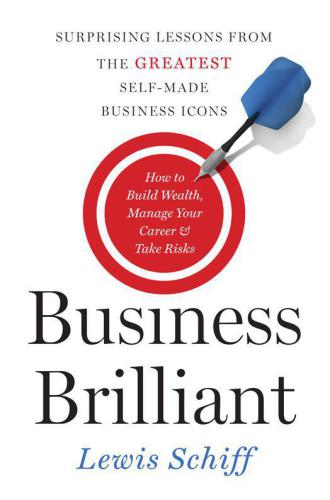
Business Brilliant
Surprising Lessons from the Greatest Self-Made Business Icons
کتاب های مرتبط
- اطلاعات
- نقد و بررسی
- دیدگاه کاربران
نقد و بررسی

February 25, 2013
Schiff (The Middle-Class Millionaire), executive director of Inc. magazine's Business Owners Council, pulls no punches as he challenges the status quo and the wisdom of financial gurus like Suze Orman. At the heart of the book is the question: "What is the difference between middle-class people and millionaires?" Schiff uses a 2009 survey by Russ Prince together with results that Prince achieved with his wealthy clients to supply many of his answers. One group was a sampling of middleclass households, whereas the other groups were self-made millionaires (those who started out middleclass). Though the facts can be dizzying, Schiff offers useful insights such as "people who are the most brilliant at business are also those who fail most often," and urges readers to understand that "failure can be good." Meanwhile, he cautions against "the myth of innovation." Ultimately, the difference between middle-class and millionaire is that "middle-class people protect themselves by becoming more well-rounded and ordinary, while the millionaires enrich themselves by becoming more specialized and extraordinary." It's hard to go wrong with advice like that.

February 1, 2013
An engaging look at "realigning our career-development practices with the world we live in today." Inc. magazine's Business Owners Council executive director Schiff (The A to Z Money Book from Armchair Millionaire, 2005, etc.) presents research on the differences in outlook between two groups: those with net worths in the range of $1 million to $10 million and those with net worths between $50,000 and $80,000. "The starkness of the gap between the two groups was stunning," he writes--as was "the conflict" between the ideas of those who have achieved success and those who haven't. The author presents the research along with case studies and arguments against popularly held misconceptions about how people get rich. Schiff takes issue with experts like Suze Orman who recommend savings and frugality as the path to riches; the author argues that it distracts from the goal of making more money. He examines the origins of the financial success of Warren Buffett and Bill Gates, and he is also concerned with establishing the importance of taking ownership and responsibility for financial and life decisions. He emphasizes repeatedly the importance of asking and learning negotiating skills. Most new hires, he writes, do not negotiate salaries and terms with their employers, leaving thousands of dollars on the table because of it. Schiff also discusses how to formulate negotiating strategies and put together financial plans, and he provides a list of "essentials" for becoming business brilliant, including: "Write Down Your Goals," "Commit to What You Do Best," "Get a Coach" and "Don't Procrastinate." Not necessarily groundbreaking, but a mostly intriguing, different kind of take on the self-help moneymaking genre.
COPYRIGHT(2013) Kirkus Reviews, ALL RIGHTS RESERVED.

May 1, 2013
Best-selling author Schiff (executive director of Inc. Magazine's Business Owners Council service; The Influence of Affluence: The Rise of the New Rich and How They Are Changing America) argues that the "business brilliant" ways of the wealthy may be learned. He shares the results of a widespread survey he conducted after the 2008 financial crisis to determine how the "self-made wealthy" continued to prosper. Schiff's examples feature self-made leaders such as Richard Branson and Bill Gates. However, he ultimately debunks what he calls "myths of wealth" by highlighting the differences between the middle class and self-made millionaires; for example, 30 percent of the middle class thought "coming out on top in business dealings is paramount," while 75 percent of self-made millionaires agreed with that statement. Chapters on imitation over innovation, negotiations, and social contacts are followed by an appendix of 17 essentials to master on the road to wealth. VERDICT A fascinating read that challenges popular opinions about what it takes to be wealthy. Recommended.--Sarah Statz Cords, Reader's Advisor Online, Middleton, WI
Copyright 2013 Library Journal, LLC Used with permission.

February 15, 2013
Don't pooh-pooh this alternative view of success right off the bat. Entrepreneur and author Schiff (The Armchair Millionaire, 2001; The Middle-Class Millionaire, 2007) builds his narrative on solid evidence, including research data comparing and contrasting the self-made person with the usual middle class. The lessons are drawn not only from survey says but also lifted from the lives of well-known, powerful entrepreneurs, such as Warren Buffett, Bill Gates, Richard Branson, Suze Orman, and others. His seven tenets are simple and supported by both facts and emotions: do what you love, but follow the money; save less, earn more; imitate, don't innovate; know-how is good, know-who is better; win-win is a loser; spread the work, spread the wealth; and nothing succeeds like failure. Where he falters is in the last chapter, where the LEAP (learn-earn, assistance-persistence) principles and its activities are detailed. Why? It's the makings of another book, and too dense for maximum impact.(Reprinted with permission of Booklist, copyright 2013, American Library Association.)

























دیدگاه کاربران